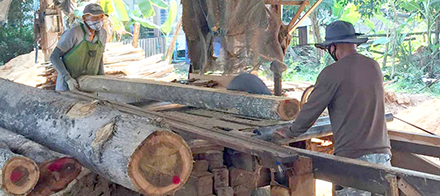
Little is known about the small and microsized entities (SmEs) engaged in the forestry sector in the Mekong region, their characteristics, the number and gender of people involved in the businesses, their supply chains and levels of compliance with regulations. A new briefing published by the EU FLEGT Facility provides analysis, insights and recommendations to improve the position of SmEs in the Mekong forestry sector. Source: Timberbiz
Conducting regulatory assessments of forest and timber-based SmEs in Laos, Myanmar/Burma, Thailand and Vietnam using a supply chain analysis model, the EU FLEGT Facility found that the supply chains of SmEs consist predominantly of informal households that operate without business registration.
The briefing note outlines the characteristics of the SmEs engaged in the forestry sector in the Mekong region, describing the types of businesses, their size and prevelance in the countries. It also describes how these businesses operate and how they have organised themselves.
While SmEs play a major role in national economies and rural livelihoods, they often remain informal. The briefing note outlines the reasons and consequences for the informality, while also looking at the participation and empowerment of women in these enterprises.
With Laos, Thailand and Vietnam moving closer to achieving and demonstrating legality in their timber supply chains, the briefing also looks at how FLEGT VPAs can create incentives for SmEs to operate formally.
The briefing concludes with a range of cross-cutting policy recommendations.
The Swedish International Development Agency (Sida) supported the EU FLEGT Facility in conducting regulatory assessments of forest and timber-based SmEs in Laos, Myanmar/Burma, Thailand and Vietnam.
Read the briefing note at: www.euflegt.efi.int/es/publications/small-and-micro-sized-entities-in-the-mekong-region-s-forest-sector







